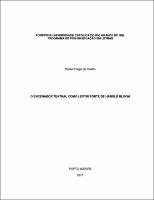| Share record |


|
Please use this identifier to cite or link to this item:
https://tede2.pucrs.br/tede2/handle/tede/2026Full metadata record
| DC Field | Value | Language |
|---|---|---|
| dc.creator | Castro, Daniel Fraga de | - |
| dc.creator.Lattes | http://buscatextual.cnpq.br/buscatextual/visualizacv.do?id=K4427805D7 | por |
| dc.contributor.advisor1 | Barberena, Ricardo Araújo | - |
| dc.contributor.advisor1Lattes | http://buscatextual.cnpq.br/buscatextual/visualizacv.do?id=K4760734P5 | por |
| dc.date.accessioned | 2015-04-14T13:38:33Z | - |
| dc.date.available | 2012-02-24 | - |
| dc.date.issued | 2011-12-27 | - |
| dc.identifier.citation | CASTRO, Daniel Fraga de. O encenador teatral como leitor forte de Harold Bloom. 2011. 133 f. Dissertação (Mestrado em Letras) - Pontifícia Universidade Católica do Rio Grande do Sul, Porto Alegre, 2011. | por |
| dc.identifier.uri | http://tede2.pucrs.br/tede2/handle/tede/2026 | - |
| dc.description.resumo | O relacionamento entre teatro e literatura pode ser estudado através da intertextualidade, mais especificadamente, a angústia da influência do crítico norteamericano Harold Bloom. De acordo com esta teoria da poesia, toda leitura é uma desleitura, uma interpretação que desvia-se do sentido do texto. Leitores fortes são aqueles que conseguem criar seus próprios significados nos textos que leem. Conforme esta visão o procedimento teatral deve ser um desvio do texto literário. O encenador deve criar seus próprios significados na encenação e libertar-se do aspecto puramente literário da obra. Para comprovar isso, foi entregue a três jovens diretores um conto para ser encenado. O texto de Franz Kafka Os que passam por nós correndo exige força criativa por parte do leitor que deve desviar-se dele para poder concretizá-lo no palco. A distância entre as diferentes encenações comprova como a interpretação pessoal influi na realização cênica e, apesar de serem artes autônomas, há uma limiaridade entre elas. | por |
| dc.description.abstract | The relationship between theater and literature can be studied through intertextuality, more specifically, the "anxiety of influence" of the american critic Harold Bloom. According to this theory of poetry, every reading is a misreading , an interpretation that departs from the text's meaning. Those who are strong readers can create their own meanings in the texts they read. In this view the procedure should be a twist of the literary text. The director must create their own meanings in the staging and free himself from the purely literary aspect of the work. To prove this, was given to three young directors a tale to be staged. The text of Franz Kafka "Those who pass us by running" requires creative force from the reader who should swerve it to be able to bring it on stage. The distance between the different scenes shows how the personal interpretation influences the scenic realization and, despite they are autonomous art forms, there is a threshold between them. | eng |
| dc.description.provenance | Made available in DSpace on 2015-04-14T13:38:33Z (GMT). No. of bitstreams: 1 436726.pdf: 815928 bytes, checksum: 36d58dbf487e7dc6f4d2ba39aa1d94eb (MD5) Previous issue date: 2011-12-27 | eng |
| dc.format | application/pdf | por |
| dc.thumbnail.url | http://tede2.pucrs.br:80/tede2/retrieve/8091/436726.pdf.jpg | * |
| dc.language | por | por |
| dc.publisher | Pontifícia Universidade Católica do Rio Grande do Sul | por |
| dc.publisher.department | Faculdade de Letras | por |
| dc.publisher.country | BR | por |
| dc.publisher.initials | PUCRS | por |
| dc.publisher.program | Programa de Pós-Graduação em Letras | por |
| dc.rights | Acesso Aberto | por |
| dc.subject | LITERATURA | por |
| dc.subject | TEATRO (LITERATURA) | por |
| dc.subject | INTERTEXTUALIDADE | por |
| dc.subject | KAFKA, FRANZ - CRÍTICA E INTERPRETAÇÃO | por |
| dc.subject | POESIA - HISTÓRIA E CRÍTICA | por |
| dc.subject.cnpq | CNPQ::LINGUISTICA, LETRAS E ARTES::LETRAS | por |
| dc.title | O encenador teatral como leitor forte de Harold Bloom | por |
| dc.type | Dissertação | por |
| Appears in Collections: | Programa de Pós-Graduação em Letras | |
Files in This Item:
| File | Description | Size | Format | |
|---|---|---|---|---|
| 436726.pdf | Texto Completo | 796.8 kB | Adobe PDF |  Download/Open Preview |
Items in DSpace are protected by copyright, with all rights reserved, unless otherwise indicated.




